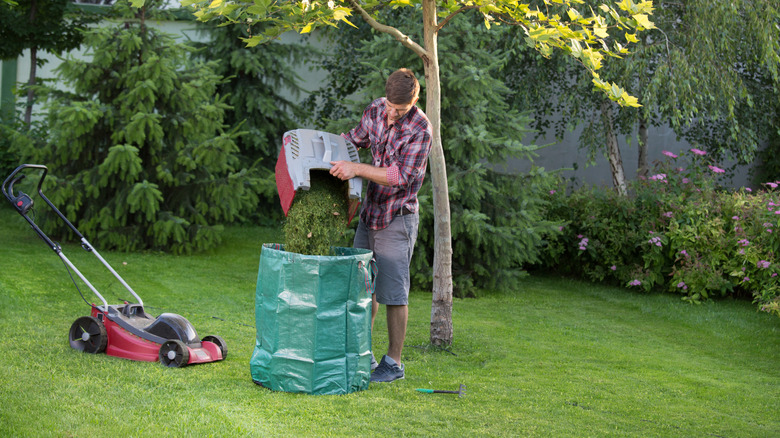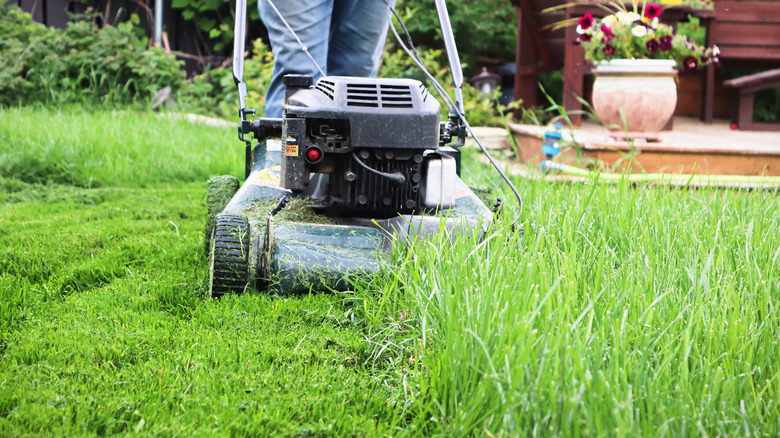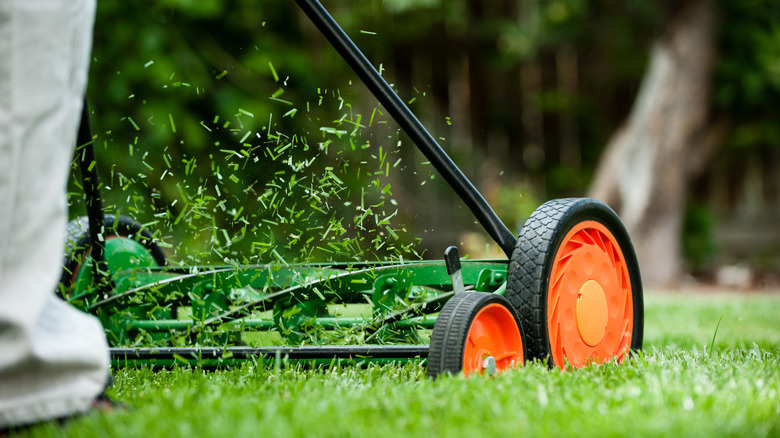Stop Throwing Grass Clippings Away After Mowing The Lawn. Here's Why
Mowing your lawn on a hot summer's day can take enough work in and of itself. But then, after you've finished mowing and your lawn is looking perfectly trimmed and tidy, you still have to gather all the grass clippings into big paper bags to put on the curb. As it turns out, this process is not only physically exhausting but also actively bad for your lawn. In fact, according to the University of Minnesota, grass clippings should not be removed because they are free fertilizer and help add nitrogen back into the soil as they decompose. So, by throwing away your grass clippings, you are not only making more work for yourself but are also missing out on an easy way to keep your soil nutrient-rich and healthy.
On top of this, letting your grass clippings stay where they are may even reduce the number of weeds in your yard by creating a natural layer of mulch that stifles unwanted plants before they grow. This mulch-like layer of grass also acts as insulation and can help keep your lawn moist and cool. This is especially important in the dry summer months and helps conserve water.
What if you have too much grass?
However, (just like when leaving dead leaves in your yard) with grass clippings, there is a fine balance between just enough and too much. Typically, you are only recommended to leave grass clipping on your lawn if they are dry and an inch or less in length. If you haven't mowed for a long time and your grass clippings are longer than one inch (or if you mow after a rain and the grass is wet), then the clippings may form clumps in your yard, which will lead to brown patches.
However, if you see clumps of grass forming, that doesn't mean you should start bagging your grass and throwing it away. Instead, first, try separating the clumps with a rake or leaf blower. If you have too many grass clippings, you can also use some of them in other areas of your yard. Grass clippings make for great garden mulch and flower food. They also are great additions to a compost bin. You can even use dry grass clippings to stuff a scarecrow as a fun Halloween decoration.
When you should get rid of grass clippings
However, there are certain situations when you should get rid of your grass clippings instead of keeping them for your yard or garden. Namely, if you believe your grass has a fungal disease, then you should dispose of your grass clippings to prevent the fungus from spreading. Fungal diseases are typically caused by overwatering. To prevent fungal lawn diseases, the best time to water your lawn is in the early morning once or twice a week (you should not water your lawn every day).
Another reason you may want to ditch your grass clippings is if your lawn has been treated with herbicides or pesticides. If this is the case, then you should not use your grass clippings in the vegetable garden or compost as the chemicals could negatively impact your plants and garden.
So, if you need to get rid of your grass clippings, how should you do it? If possible, you should avoid putting your clippings directly into the trash because grass that goes to landfills does not decompose properly and simply adds to greenhouse gas emissions. Because of this, throwing grass away may be illegal in your area. So, instead, try to use your local city's curbside composting pickup or drop your grass clippings off at a local yard waste disposal center.


